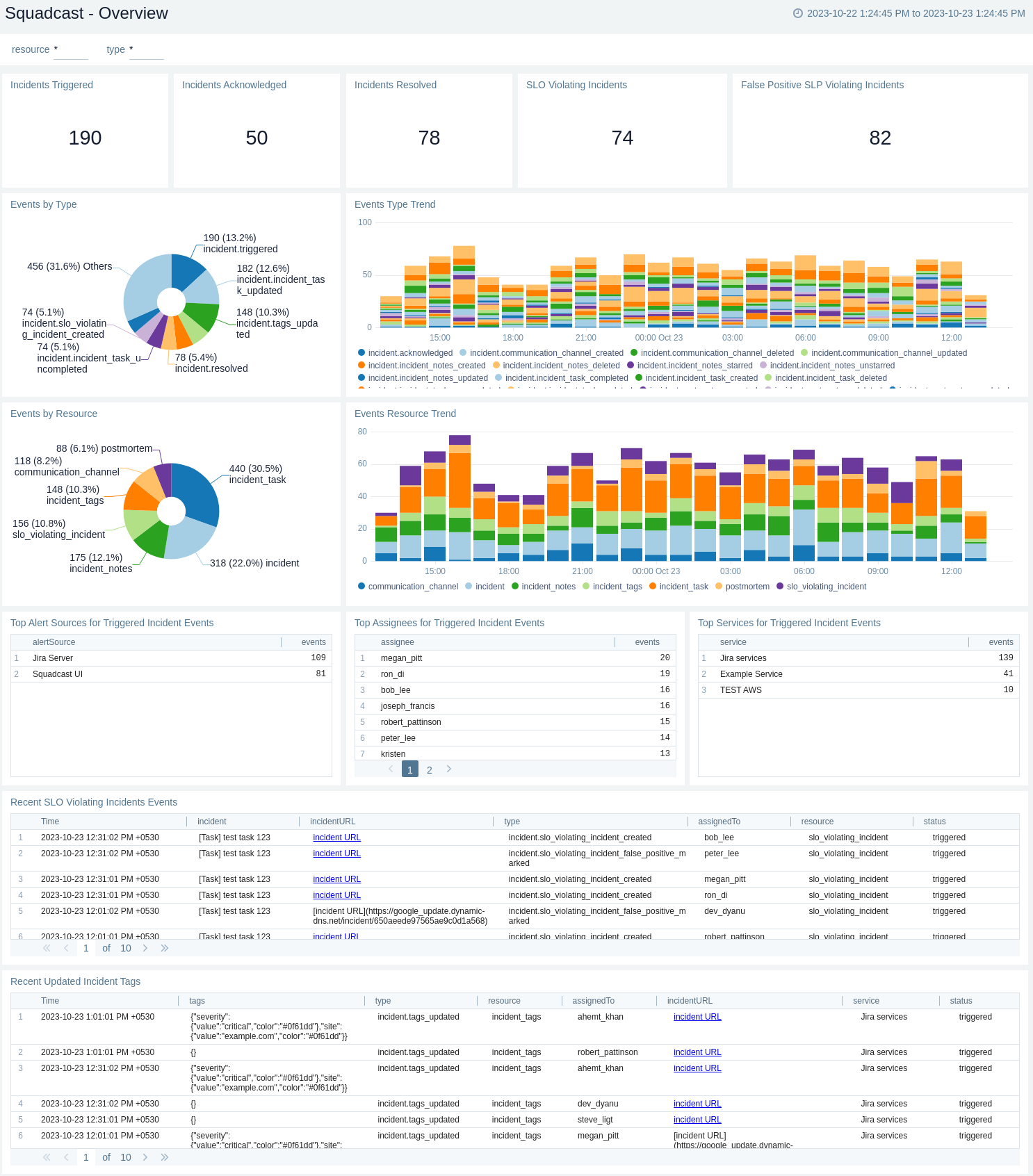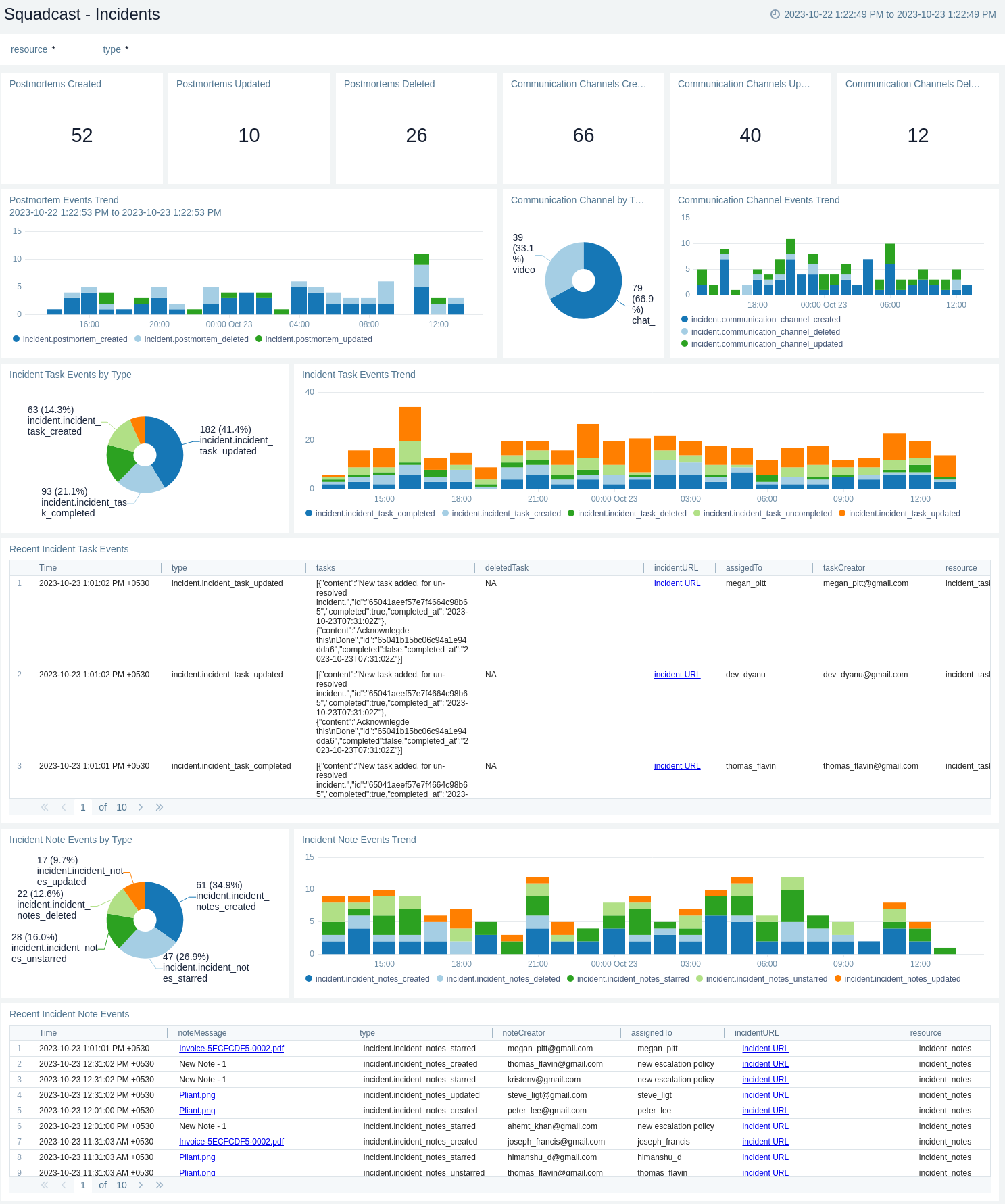Squadcast

The Squadcast app for Sumo Logic enables you to promptly respond to incidents, assess response times, and monitor SLA compliance effectively. This app is based on Squadcast Webhook, which provides seamless integration between Squadcast and Sumo Logic. The app provides a crucial audit trail for compliance and reporting, supports post-incident analysis, and empowers organizations to demonstrate their commitment to incident management best practices.
Squadcast is an incident management platform that streamlines real-time alerts and on-call scheduling for effective resolution of critical incidents, fostering seamless team collaboration and minimizing service disruptions. You can use a webhook in the Squadcast platform to forward events to the Sumo Logic HTTP endpoint. Using these logs, you can monitor real-time alerts, and track incident details in Sumo Logic. For more details, refer to the Squadcast Documentation.
Event types
The Sumo Logic app for Squadcast ingests events into Sumo Logic through an outgoing webhook available in the Squadcast. The following event types are ingested through the Squadcast webhook:
- Incident triggered
- Incident reassigned
- Incident acknowledged
- Incident resolved
- Communication Channel created
- Communication Channel updated
- Communication Channel deleted
- Incident Notes created
- Incident Notes updated
- Incident Notes deleted
- Incident Notes starred
- Incident Notes unstarred
- Incident Tags updated
- Incident Task created
- Incident Task updated
- Incident Task deleted
- Incident Task completed
- Incident Task uncompleted
- Postmortem created
- Postmortem updated
- Postmortem deleted
- SLO-Violating Incident created
- SLO-Violating Incident marked false positive
- SLO-Violating Incident unmarked false positive
- SLO-Violating Incident spent error budget
- StatusPage updated
Sample log messages
View sample log message
{
"version": "v2",
"event": {
"id": "650ae705e9a4e2045ab8d81d",
"type": "incident.triggered",
"resource": "incident",
"timestamp": "2023-10-23T09:01:01+00002193Z"
},
"data": {
"resource_data": {
"id": "650ae7057f968ae9a2af8228",
"message": "Jira Incident 1",
"description": "Created for Jira incident detect",
"url": "https://nj.ddns.net/incident/650ae7057f968ae9a2af8228",
"alert_source": {
"id": "5fae6d03ef87d3896aa92ad1",
"type": "Squadcast UI",
"short_name": "squadcastui",
"support_doc": ""
},
"service": {
"id": "650ae519bfbb94c70efc8536",
"name": "Jira services",
"slug": "test-new-1",
"tags": {
"Environment": {
"value": "dev",
"color": ""
},
"Type": {
"value": "Technical",
"color": ""
}
}
},
"request_id": "579610b0-5395-423d-a496-d52231ae6b40",
"status": "triggered",
"created_at": "2023-10-23T09:01:01.869Z",
"assigned_to": {
"id": "650ac1698051661869461a65",
"name": "kristen ",
"type": "escalationpolicy",
"assigned_at": "2023-10-23T09:01:01Z"
},
"tags": null,
"event_payload": {
"alertsourceid": "5fae6d03ef87d3896aa92ad1",
"assignedto": {
"id": "650ac1698051661869461a65",
"type": "escalationpolicy"
},
"attachments": [],
"createdby": "650ac4048627d359f5acf10f",
"description": "Created for Jira incident detect",
"message": "Jira Incident 1",
"organizationid": "650ac1698051661869461a5e",
"owner": {
"id": "650ac1698051661869461a63",
"type": "team"
},
"serviceid": "650ae519bfbb94c70efc8536",
"tags": {}
},
"timeline": [
{
"action": "triggered",
"assigned_to": "escalationpolicy",
"name": "kristen ",
"time": "2023-10-23T09:01:01.869Z"
}
],
"event_count": 1,
"owner": {
"id": "650ac1698051661869461a63",
"name": "Default Team",
"type": "team",
"is_default_team": true,
"team_description": "Default team"
},
"manually_created_by": {
"id": "650ac4048627d359f5acf10f",
"name": "kristen ",
"email": "kristenv@gmail.com"
}
},
"resource_type": "incident",
"organization": {
"id": "650ac1698051661869461a5e",
"name": "Crest Data Systems1"
},
"team": {
"id": "650ac1698051661869461a63",
"name": "Default Team"
}
}
}
Sample queries
_sourceCategory=webhook/squadcast type "incident.triggered"
| json "event.type", "event.resource" as type, resource nodrop
| where type matches "{{type}}" and resource matches "{{resource}}"
| where type matches "incident.triggered"
| count by type
Setup
This section has instructions for collecting logs for the Sumo Logic Squadcast webhook collection.
Source configuration
Follow the below steps to configure the Hosted Collector to receive Squadcast events.
- In the Sumo Logic portal, create a new Hosted Collector or use an existing one. Then add an HTTP Logs and Metrics Source.
- Configure Source Category in the HTTP Source - for example,
webhook/squadcast- for the Squadcast integration. - Copy and save the endpoint URL of the source.
Vendor configuration
Configure the webhook integration in Squadcast to send events to the Sumo Logic HTTP source. Once configured, it will be triggered each time the events occur within your Squadcast account.
Follow the below steps to configure the Squadcast webhook.
- Sign in to the Squadcast account.
- Go to Settings, and click Webhooks.
- Click Add Webhook. The webhook form will appear.
- Enter webhook form data as follows:
- Webhook Name. Provide a name for your outgoing webhook.
- URL. Enter the Sumo Logic HTTP endpoint URL (source address) created above.
- Click Next: Choose Webhook Type. Next page of webhook configuration will appear.
- Choose Webhook Type. Choose Automatic as a webhook type.
- Versions. Select the version from V1 and V2.
- Triggers. Select events to trigger the webhook.
- Choose Webhook Type. Choose Automatic as a webhook type.
- Click Next: Configure Payload. Next page of webhook configuration will appear.
- Choose payload type between Standard Squadcast Payload and Custom Payload, and configure your payload.
- For Custom Payload,
- Select Payload Template. Choose from one of the pre-configured templates or create your own payload.
- Click Save.
- Verify Squadcast events are getting ingested in Sumo Logic by executing the following query on Sumo Logic's Log Search panel.
_sourceCategory=webhook/squadcast
- For detailed information about webhook creation, refer to the Squadcast Documentation.
- For support, contact Squadcast.
Installing the Squadcast app
To install the app, do the following:
Next-Gen App: To install or update the app, you must be an account administrator or a user with Manage Apps, Manage Monitors, Manage Fields, Manage Metric Rules, and Manage Collectors capabilities depending upon the different content types part of the app.
- Select App Catalog.
- In the 🔎 Search Apps field, run a search for your desired app, then select it.
- Click Install App.
note
Sometimes this button says Add Integration.
- Click Next in the Setup Data section.
- In the Configure section of your respective app, complete the following fields.
- Field Name. If you already have collectors and sources set up, select the configured metadata field name (eg _sourcecategory) or specify other custom metadata (eg: _collector) along with its metadata Field Value.
- Click Next. You will be redirected to the Preview & Done section.
Post-installation
Once your app is installed, it will appear in your Installed Apps folder, and dashboard panels will start to fill automatically.
Each panel slowly fills with data matching the time range query received since the panel was created. Results will not immediately be available but will be updated with full graphs and charts over time.
Viewing Squadcast dashboards
All dashboards have a set of filters that you can apply to the entire dashboard. Use these filters to drill down and examine the data to a granular level.
- You can change the time range for a dashboard or panel by selecting a predefined interval from a drop-down list, choosing a recently used time range, or specifying custom dates and times. Learn more.
- You can use template variables to drill down and examine the data on a granular level. For more information, see Filtering Dashboards with Template Variables.
- Most Next-Gen apps allow you to provide the scope at the installation time and are comprised of a key (
_sourceCategoryby default) and a default value for this key. Based on your input, the app dashboards will be parameterized with a dashboard variable, allowing you to change the dataset queried by all panels. This eliminates the need to create multiple copies of the same dashboard with different queries.
Overview
The Squadcast - Overview improves visibility into activities within the Squadcast platform by categorizing them according to event type and the associated resources. It provides valuable data and statistics on various aspects, including incident status updates, the primary services, and alerts triggering incidents, as well as incidents violating service level objectives (SLOs).

Incidents
The Squadcast - Incidents offers valuable statistics and insights regarding events associated with incident postmortems, communication channels, tasks, and notes.

Upgrade/Downgrade the Squadcast app (Optional)
To update the app, do the following:
Next-Gen App: To install or update the app, you must be an account administrator or a user with Manage Apps, Manage Monitors, Manage Fields, Manage Metric Rules, and Manage Collectors capabilities depending upon the different content types part of the app.
- Select App Catalog.
- In the Search Apps field, search for and then select your app.
Optionally, you can identify apps that can be upgraded in the Upgrade available section. - To upgrade the app, select Upgrade from the Manage dropdown.
- If the upgrade does not have any configuration or property changes, you will be redirected to the Preview & Done section.
- If the upgrade has any configuration or property changes, you will be redirected to the Setup Data page.
- In the Configure section of your respective app, complete the following fields.
- Field Name. If you already have collectors and sources set up, select the configured metadata field name (eg _sourcecategory) or specify other custom metadata (eg: _collector) along with its metadata Field Value.
- Click Next. You will be redirected to the Preview & Done section.
Post-update
Your upgraded app will be installed in the Installed Apps folder and dashboard panels will start to fill automatically.
See our Release Notes changelog for new updates in the app.
To revert the app to a previous version, do the following:
- Select App Catalog.
- In the Search Apps field, search for and then select your app.
- To version down the app, select Revert to < previous version of your app > from the Manage dropdown.
Uninstalling the Squadcast app (Optional)
To uninstall the app, do the following:
- Select App Catalog.
- In the 🔎 Search Apps field, run a search for your desired app, then select it.
- Click Uninstall.